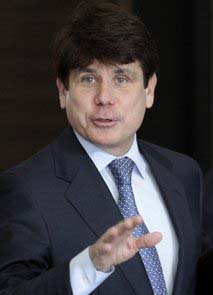 |
|---|
| Former Illinois Gov. Rod Blagojevich arrives at the federal building in Chicago, Wednesday, July 7, 2010. |
 
|
Aide: Blago hid in bathroom from budget director
Associated Press
Thu July 8, 2010
CHICAGO - Rod Blagojevich hid in the bathroom, ducked into a back room and left the office early to avoid discussing complex issues with his budget director, his former deputy said Thursday at the ousted governor's corruption trial.
Blagojevich worked in the office less than nine hours a week and had trouble focusing on legislation, former Deputy Governor Robert Greenlee said in testimony that portrayed the governor as disengaged in the affairs of state government.
His testimony came as prosecutors announced they probably would rest their case on Tuesday, weeks ahead of schedule, and as Blagojevich was heard on an FBI wiretap tape saying he would get "tangible political support" if he named U.S. Rep. Jesse Jackson Jr. to the Senate seat Barack Obama was leaving to become president.
"Specific amounts and everything," Blagojevich said on the tape, adding, "some of it up front." Greenlee testified that he believed the governor had been talking about campaign money in exchange for the seat.
Jackson has not been charged with wrongdoing in the case, but prosecutors have said there is evidence that some of his supporters spoke about raising funds for Blagojevich.
The trial began in earnest with opening statements June 8 and the prosecution's case was expected to last through the month of July, but Assistant U.S. Attorney Reid Schar told U.S. District Judge James B. Zagel on Thursday after jurors left for the weekend "there is a good chance" the government will rest on Tuesday.
Blagojevich's attorneys immediately asked for a break in the trial that would allow them to start their case a week from Monday. Zagel told them to be ready Wednesday.
Blagojevich, 53, has pleaded not guilty to scheming to get a high-paying job, a Cabinet post or a large campaign contribution in exchange for the appointment to the Senate seat. He has also pleaded not guilty to plotting to use his power as governor to engage in racketeering.
His brother, Robert Blagojevich, 54, has pleaded not guilty to taking part in the alleged Senate scheme and what prosecutors call illegal efforts to pressure two businessmen for campaign contributions.
Greenlee testified that most weeks Blagojevich spent between two and eight hours in his office and most of the time was at home or at high-profile events.
He said he often conferred with the governor by phone but once had to go to dinner with Blagojevich and his family at a bowling alley to force him to focus on 20 pieces of legislation that would have become law if not addressed immediately. Greenlee said Blagojevich ended up vetoing several.
Greenlee said that budget director John Filan had to chase Blagojevich to get him to address complex state issues and the governor would try to get away.
"He would hide in the bathroom, hide in the back room or leave early," Greenlee said.
Greenlee also said Blagojevich didn't like to hear bad news, refused to believe it and became dismissive of staffers who insisted on conveying it to him.
In late 2008 when Obama was headed for the White House, Greenlee said, Blagojevich thought about appointing himself to the Senate seat and asked if he did so whether his wife, Patti, would be allowed to lobby the senators. Greenlee said he checked and found that Senate rules allowed it but say that Senate spouses who work as lobbyists should not lobby the person to whom they are married.
Even as Blagojevich was hoping to be named secretary of health and human services or to another major post in the Obama administration, the Obama camp was apparently trying to keep its distance.
Blagojevich was initially not invited to the huge, nationally televised Obama victory rally in downtown Chicago on election night 2008, Greenlee said. The Obama campaign, Greenlee said, had "concerns about being seen with him."
But Blagojevich's aides worried that would mean embarrassing publicity. So they arranged to get the governor credentials for the rally on the condition that he not actually attend, Greenlee testified.
As they neared the end of their case, prosecutors returned to an issue from earlier in the trial. They focused on an alleged effort by Blagojevich to pressure Children's Memorial Hospital by holding out the prospect of increased state funding in exchange for a campaign contribution.
Blagojevich initially wanted to approve an increase in the amount of money the hospital is allowed to charge for treating sick children under state regulation. But he abruptly asked if the increase could be stopped. Greenlee said it could.
"So we can pull it back if we need to," Greenlee quoted Blagojevich as saying. "That's good to know."


 Share your thoughts in the Forum
Share your thoughts in the Forum
